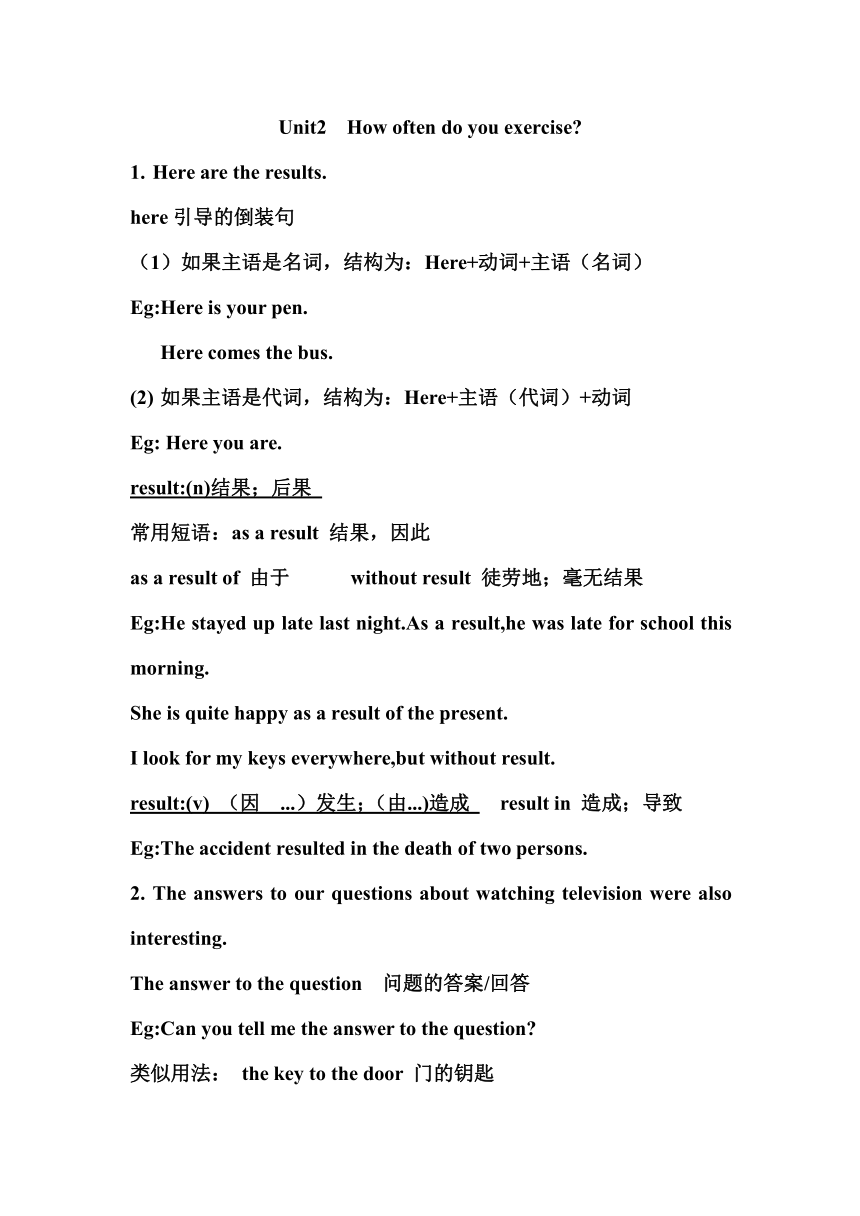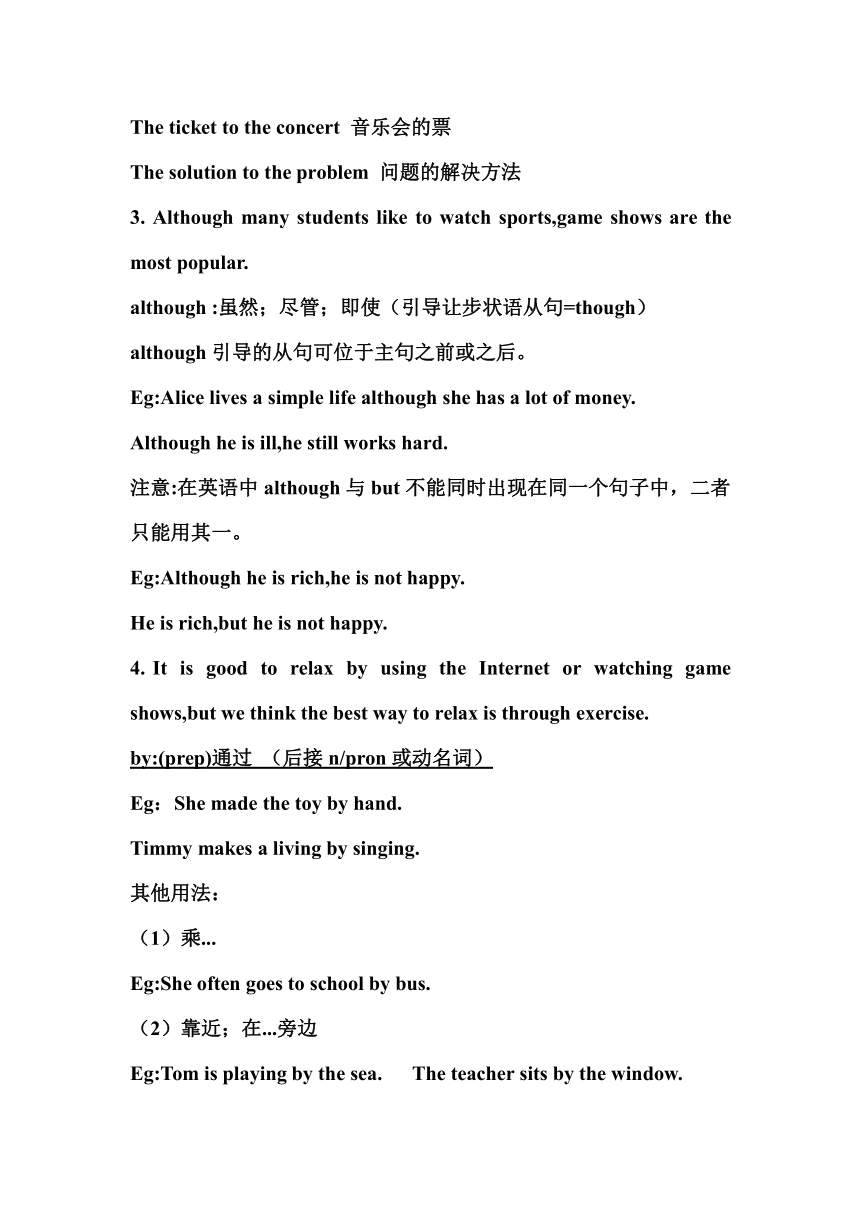Unit 2 How often do you exercise? 讲义人教版英语八年级上册
文档属性
| 名称 | Unit 2 How often do you exercise? 讲义人教版英语八年级上册 |  | |
| 格式 | docx | ||
| 文件大小 | 19.8KB | ||
| 资源类型 | 教案 | ||
| 版本资源 | 人教新目标(Go for it)版 | ||
| 科目 | 英语 | ||
| 更新时间 | 2024-01-11 21:00:40 | ||
图片预览


文档简介
Unit2 How often do you exercise
Here are the results.
here引导的倒装句
如果主语是名词,结构为:Here+动词+主语(名词)
Eg:Here is your pen.
Here comes the bus.
如果主语是代词,结构为:Here+主语(代词)+动词
Eg: Here you are.
result:(n)结果;后果
常用短语:as a result 结果,因此
as a result of 由于 without result 徒劳地;毫无结果
Eg:He stayed up late last night.As a result,he was late for school this morning.
She is quite happy as a result of the present.
I look for my keys everywhere,but without result.
result:(v) (因 ...)发生;(由...)造成 result in 造成;导致
Eg:The accident resulted in the death of two persons.
The answers to our questions about watching television were also interesting.
The answer to the question 问题的答案/回答
Eg:Can you tell me the answer to the question
类似用法: the key to the door 门的钥匙
The ticket to the concert 音乐会的票
The solution to the problem 问题的解决方法
Although many students like to watch sports,game shows are the most popular.
although :虽然;尽管;即使(引导让步状语从句=though)
although引导的从句可位于主句之前或之后。
Eg:Alice lives a simple life although she has a lot of money.
Although he is ill,he still works hard.
注意:在英语中although与but不能同时出现在同一个句子中,二者只能用其一。
Eg:Although he is rich,he is not happy.
He is rich,but he is not happy.
It is good to relax by using the Internet or watching game shows,but we think the best way to relax is through exercise.
by:(prep)通过 (后接n/pron或动名词)
Eg:She made the toy by hand.
Timmy makes a living by singing.
其他用法:
乘...
Eg:She often goes to school by bus.
(2)靠近;在...旁边
Eg:Tom is playing by the sea. The teacher sits by the window.
不迟于;在...之前
Eg:My mom told me to come back by 10p.m.
由...所作
Eg:The newly-published novel by JK Rowling is very popular. through:(prep)以;凭借
Eg:He knew the news through the newspaper.
穿过;通过(多指穿过门、窗、洞、森林、城市、隧道等)
Eg:The River Thames flows through London.(泰晤士河)
辨析:across,through,over
across:从物体表面横过
Eg:The girl goes across the road.
through:从物体内部穿过
Eg:The bird gets in the kitchen through the window.
over:从物体上方越过
Eg:She climbs over the wall.
..but we were surprised that ninety percent of them use the Internet every day.
be surprised +that 从句 对...很吃惊
be surprised at sth.对某事感到惊讶
be surprised to do sth.对做某事感到惊讶
Eg:I’m surprised that you are the only one to think in that way.
I was surprised at his answer.
The students are surprised to do so much homework.
surprise(n)惊讶
用法:(1)to one’s surprise 令某人惊奇地是=be surprised to do sth.
Eg:To his surprise,he found his wallet at last.
He was surprised to find his wallet at last.
in surprise 惊奇地
Eg:The two girls look at each other in surprise.
Surprised:感到惊讶的 Surprising:令人惊讶的
And remember, “Old habits die hard”旧习难改
die(vi)消失、灭亡、死亡 died dying
Eg:The fish will die without water.
The old man died two months ago.
辨析:die,dead,death,dying
die:消失;灭亡;死亡(非延续性动词,不能与表示一段时间的状语连用)
dead:(adj)死的;失去生命的(可与表示一段时间的状语连用) be dead
death:(n)死亡
dying:(adj)垂死的;奄奄一息的;(做定语/表语)
Eg:The fish will die without the water.
The fish is dead.
The death of the fish causes its owner sad.
The flowers are dying.
Really How come
How come 为什么呢?怎么会呢 (对某事或某种现象存在疑惑)
相当于why
用法:(1)单独使用 (2)接句子(陈述句语序)
Eg:You were late again.How come
How come you were late again
辨析:why,how come
why:其后接的句子要用疑问句语序
Eg:Why were you late again
How come:其后接的句子要用陈述句语序
Eg:How come you were late again
How often do they stay up late
stay up:熬夜(V+adv结构)
Eg:Staying up late is bad for your skin.
“V+up”型的其他短语
Eg: look up查阅;向上看 Put up 张贴
Pick up捡起;(开车)接人 make up编造;弥补
Set up 建立 take up占据;开始从事
Here are the results.
here引导的倒装句
如果主语是名词,结构为:Here+动词+主语(名词)
Eg:Here is your pen.
Here comes the bus.
如果主语是代词,结构为:Here+主语(代词)+动词
Eg: Here you are.
result:(n)结果;后果
常用短语:as a result 结果,因此
as a result of 由于 without result 徒劳地;毫无结果
Eg:He stayed up late last night.As a result,he was late for school this morning.
She is quite happy as a result of the present.
I look for my keys everywhere,but without result.
result:(v) (因 ...)发生;(由...)造成 result in 造成;导致
Eg:The accident resulted in the death of two persons.
The answers to our questions about watching television were also interesting.
The answer to the question 问题的答案/回答
Eg:Can you tell me the answer to the question
类似用法: the key to the door 门的钥匙
The ticket to the concert 音乐会的票
The solution to the problem 问题的解决方法
Although many students like to watch sports,game shows are the most popular.
although :虽然;尽管;即使(引导让步状语从句=though)
although引导的从句可位于主句之前或之后。
Eg:Alice lives a simple life although she has a lot of money.
Although he is ill,he still works hard.
注意:在英语中although与but不能同时出现在同一个句子中,二者只能用其一。
Eg:Although he is rich,he is not happy.
He is rich,but he is not happy.
It is good to relax by using the Internet or watching game shows,but we think the best way to relax is through exercise.
by:(prep)通过 (后接n/pron或动名词)
Eg:She made the toy by hand.
Timmy makes a living by singing.
其他用法:
乘...
Eg:She often goes to school by bus.
(2)靠近;在...旁边
Eg:Tom is playing by the sea. The teacher sits by the window.
不迟于;在...之前
Eg:My mom told me to come back by 10p.m.
由...所作
Eg:The newly-published novel by JK Rowling is very popular. through:(prep)以;凭借
Eg:He knew the news through the newspaper.
穿过;通过(多指穿过门、窗、洞、森林、城市、隧道等)
Eg:The River Thames flows through London.(泰晤士河)
辨析:across,through,over
across:从物体表面横过
Eg:The girl goes across the road.
through:从物体内部穿过
Eg:The bird gets in the kitchen through the window.
over:从物体上方越过
Eg:She climbs over the wall.
..but we were surprised that ninety percent of them use the Internet every day.
be surprised +that 从句 对...很吃惊
be surprised at sth.对某事感到惊讶
be surprised to do sth.对做某事感到惊讶
Eg:I’m surprised that you are the only one to think in that way.
I was surprised at his answer.
The students are surprised to do so much homework.
surprise(n)惊讶
用法:(1)to one’s surprise 令某人惊奇地是=be surprised to do sth.
Eg:To his surprise,he found his wallet at last.
He was surprised to find his wallet at last.
in surprise 惊奇地
Eg:The two girls look at each other in surprise.
Surprised:感到惊讶的 Surprising:令人惊讶的
And remember, “Old habits die hard”旧习难改
die(vi)消失、灭亡、死亡 died dying
Eg:The fish will die without water.
The old man died two months ago.
辨析:die,dead,death,dying
die:消失;灭亡;死亡(非延续性动词,不能与表示一段时间的状语连用)
dead:(adj)死的;失去生命的(可与表示一段时间的状语连用) be dead
death:(n)死亡
dying:(adj)垂死的;奄奄一息的;(做定语/表语)
Eg:The fish will die without the water.
The fish is dead.
The death of the fish causes its owner sad.
The flowers are dying.
Really How come
How come 为什么呢?怎么会呢 (对某事或某种现象存在疑惑)
相当于why
用法:(1)单独使用 (2)接句子(陈述句语序)
Eg:You were late again.How come
How come you were late again
辨析:why,how come
why:其后接的句子要用疑问句语序
Eg:Why were you late again
How come:其后接的句子要用陈述句语序
Eg:How come you were late again
How often do they stay up late
stay up:熬夜(V+adv结构)
Eg:Staying up late is bad for your skin.
“V+up”型的其他短语
Eg: look up查阅;向上看 Put up 张贴
Pick up捡起;(开车)接人 make up编造;弥补
Set up 建立 take up占据;开始从事
同课章节目录
- Unit 1 Where did you go on vacation?
- Section A
- Section B
- Unit 2 How often do you exercise?
- Section A
- Section B
- Unit 3 I'm more outgoing than my sister.
- Section A
- Section B
- Unit 4 What's the best movie theater?
- Section A
- Section B
- Unit 5 Do you want to watch a game show?
- Section A
- Section B
- Unit 6 I'm going to study computer science.
- Section A
- Section B
- Unit 7 Will people have robots?
- Section A
- Section B
- Unit 8 How do you make a banana milk shake?
- Section A
- Section B
- Unit 9 Can you come to my party?
- Section A
- Section B
- Unit 10 If you go to the party, you'll have a grea
- Section A
- Section B
